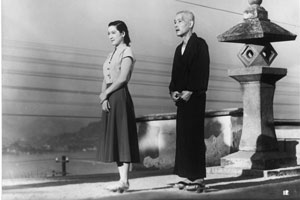Oscar snubs don’t last a lifetime
 Before the days of the competitive foreign film Oscar, no film in 1953 was honored with the annual honorary Oscar for foreign film released in the U.S. It was the first time since 1947, when the Academy started presenting an Oscar to foreign films, that no such award was given. It was also the year Ozu’s Tokyo Story was released in Japan.
Before the days of the competitive foreign film Oscar, no film in 1953 was honored with the annual honorary Oscar for foreign film released in the U.S. It was the first time since 1947, when the Academy started presenting an Oscar to foreign films, that no such award was given. It was also the year Ozu’s Tokyo Story was released in Japan.
The film didn’t get a U.S. release until 1972, which meant it didn’t technically qualify for an Oscar the year it was created. Had today’s foreign film rules been instituted in 1953, where a country selects and submits one film to the Academy for consideration in the category, maybe Tokyo Story would have made the cut in a competitive race. Maybe not.
Regardless, Tokyo Story is considered the fifth best film of all-time by those surveyed in the Sight & Sound critics poll. It landed at No. 16 on the directors poll, too. It has a Criterion Collection release, and Roger Ebert included the picture in his Great Movies series. Time tests all art, and Ozu’s minimalist masterpiece has endured, Oscar or no Oscar.
It’s become an annual tradition to deride the Academy for its snubs, particularly in the foreign language film category. This year is no different with the European Film Award’s Best Film winner, Italian mob flick Gomorrah, being left off Oscar’s short list for Best Foreign Language Film. A film that supposedly heralds the rebirth of Italian cinema should at least make the short list, right?
 Gomorrah‘s so-called snub is bad for the picture because, as Slumdog Millionaire director Danny Boyle pointed out, films that don’t have a truckload of corporate marketing dollars behind them rely on the Oscars and other awards to gain an audience. Film is still a business and the publicity generated by an Oscar is priceless. In the States, foreign language films especially need the profile boost that comes with winning an Oscar because Americans don’t flock to subtitled films.
Gomorrah‘s so-called snub is bad for the picture because, as Slumdog Millionaire director Danny Boyle pointed out, films that don’t have a truckload of corporate marketing dollars behind them rely on the Oscars and other awards to gain an audience. Film is still a business and the publicity generated by an Oscar is priceless. In the States, foreign language films especially need the profile boost that comes with winning an Oscar because Americans don’t flock to subtitled films.
That goes for many other Oscar pictures, as well. The industry has painted itself into a corner relying on the Oscars, and only the Oscars, to pad the bottom line of more challenging cinematic endeavors, or grownup movies, as I like to call them. October through January is when the great films end up in theaters to avoid the big money blockbusters that fill the screen the rest of the year. Foreign language films pop up in art house theaters only after they’ve had their shot in the arm from an Oscar nod.
There’s a business strategy behind all the releases, so one thing I can’t stand to listen to is someone telling me that a film, one that is supposedly a grand cinematic endeavor, was unjustly snubbed by Oscar. Twenty, 50, 100 years down the line, will the nomination matter? Probably not. Sometimes, the world just doesn’t know what to make of a picture when it sees it.
I once had a film professor tell me that he didn’t watch movies when they were initially released. I immediately understood what he meant. It wouldn’t have mattered if he saw Singin’ in the Rain in 1952. Back then the Gene Kelly/Stanley Donen film only snagged two Academy Award nominations. It didn’t even receive an nomination for Best Picture. Yet, here Singin’ in the Rain is today, considered one of the best films ever made by both the American Film Institute and the Sight & Sound critics poll.
How does a film go from being ignored to being considered not only the best musical of all-time, but also one of the greatest films of any genre? Time. Time will tell if Gomorrah is a truly great movie.
As a time capsule and as a celebration of cinema, the Academy Awards are an important part of film history. But they are only a part. I’m content to sit back and enjoy the show, without worrying whether my favorite film of the year Revolutionary Road is a contender or not. I’m confident that it will be a picture that stands the test of time, one people will study, will write about, will experience years down the road. It may not produce immediate results for a filmmaker in need of clout, but historical success is still worth more than anything Oscar can offer.









